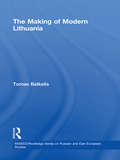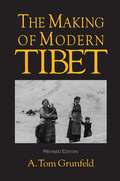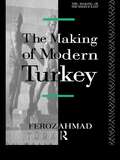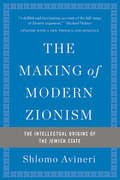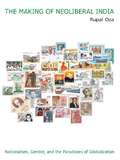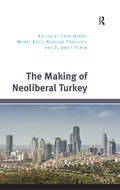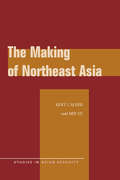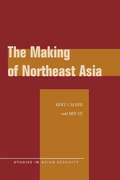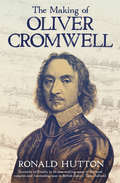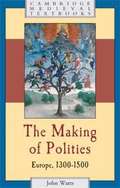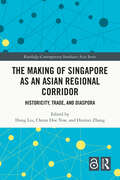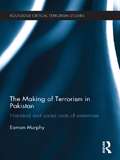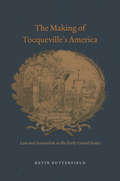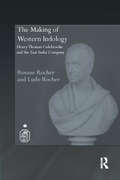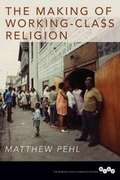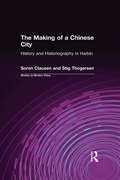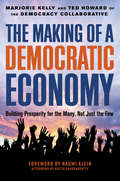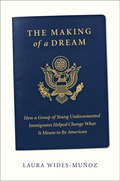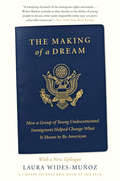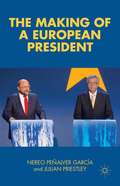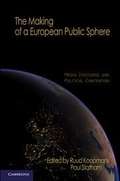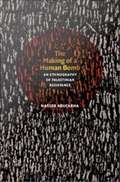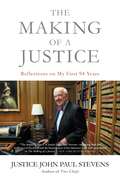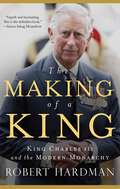- Table View
- List View
The Making of Modern Lithuania (BASEES/Routledge Series on Russian and East European Studies)
by Tomas BalkelisThis book argues that – contrary to contemporary Lithuanian nationalist rhetoric – Lithuanian nationalism was modern and socially constructed in the period from the emergence of the Lithuanian national movement in the late nineteenth century to the birth of an independent state in 1918. The book brings into sharp focus those aspects of the history of Lithuania that earlier commentators had not systematically explored: it shows how, in this period, the nascent political elite fashioned its own and the emerging nation’s identity. Moreover, factors such as the elite’s social isolation, educational experience, marital strategies and narrowly based, fragmented and uncoordinated political activities were crucial factors in shaping identity and nation-building. It demonstrates how the elite was often in conflict with the peasantry, the religious establishment and other ethnic groups, and how critical considerations such as class, religion, displacement and ethnicity – rather than national ideology – were. The book’s conclusion that Lithuanian nationalism is a construct emerging from modern social forces is highly significant for understanding nationalism and contemporary political developments in Eastern Europe more generally.
The Making of Modern Tibet
by A.Tom GrunfeldAn account of Tibet and the Tibetan people that emphasises the political history of the 20th century. This book attempts to reach beyond the polemics by considering the various historical arguments, using archival material from several nations and drawing conclusions focused on available documents.
The Making of Modern Turkey (The\making Of The Middle East Ser.)
by Ahmad FerozTurkey is the first modern secular state in a predominantly Islamic Middle East. In this major textbook, Feroz Ahmad provides a thorough examination of the political, social and economic processes which led to the formation of a new Turkey. After a chapter on "the Ottoman Legacy", the book covers the period since the revolution of 1908 and the development of the new Turkey. Successive chapters chart the progress through the single-party regime set up by Ataturk (1923-1945), the multi-party period (1945-1960) and the three military interventions of 1960, 1971 and 1980. The book ends in 1989 with the election of Turgat Ozal as president. In contrast to most current analyses of modern Turkey, the author emphasises the socio-economic changes rather than continuities as the motor of politics.
The Making of Modern Zionism: The Intellectual Origins of the Jewish State
by Shlomo AvineriAn expanded edition of a classic intellectual history of Zionism, now covering the rise of religious Zionism since the 1970sFor eighteen centuries pious Jews had prayed for the return to Jerusalem, but only in the revolutionary atmosphere of nineteenth-century Europe was this yearning transformed into an active political movement: Zionism. In The Making of Modern Zionism, the distinguished political scientist Shlomo Avineri rejects the common view that Zionism was solely a reaction to anti-Semitism and persecution. Rather, he sees it as part of the universal quest for self-determination. In sharply-etched intellectual profiles of Zionism's major thinkers from Moses Hess to Theodore Herzl and from Vladimir Jabotinsky to David Ben Gurion, Avineri traces the evolution of this quest from its intellectual origins in the early nineteenth century to the establishment of the State of Israel. In an expansive new epilogue, he tracks the changes in Israeli society and politics since 1967 which have strengthened the more radical nationalist and religious trends in Zionism at the expense of its more liberal strains. The result is a book that enables us to understand, as perhaps never before, one of the truly revolutionary ideas of our time.
The Making of Neoliberal India: Nationalism, Gender, and the Paradoxes of Globalization
by Rupal OzaThis is an ambitious study of gender and politics in India, and will be of interest to scholars of women's studies, globalization, postcolonialism, geography, media studies, and cultural studies, as well as India more generally.
The Making of Neoliberal Turkey
by Cenk Ozbay Maral Erol Z. Umut Turem Aysecan TerziogluExploring the divergent aspects of the rule of neoliberalism in Turkey since 1980s, each chapter in this book highlights a specific dimension of this socio-economic process and together, these essays construct a thorough examination of the whirlwind of changes recently experienced by Turkish society. With particular focus on the new ways in which social power operates, expert contributors explore new discourses and subjectivities around environmentalism, health, popular culture, economic policies, feminism and motherhood, urban space and minorities, class and masculinities. By questioning the primary influence of the state in these micro-political matters, they engage with concepts of neoliberalism and governmentality to provide a fresh, grounded and analytical perspective on the routes through which social power navigates the society. This sustained examination of the new axes of power and subjectivity, with a particular eye on the formation of new political spaces of governance and resistance, deepens the analysis of Turkey’s experiment with neoliberal globalization.
The Making of Neoliberal Turkey
by Cenk Ozbay Maral Erol Z. Umut Turem Aysecan TerziogluExploring the divergent aspects of the rule of neoliberalism in Turkey since 1980s, each chapter in this book highlights a specific dimension of this socio-economic process and together, these essays construct a thorough examination of the whirlwind of changes recently experienced by Turkish society. With particular focus on the new ways in which social power operates, expert contributors explore new discourses and subjectivities around environmentalism, health, popular culture, economic policies, feminism and motherhood, urban space and minorities, class and masculinities. By questioning the primary influence of the state in these micro-political matters, they engage with concepts of neoliberalism and governmentality to provide a fresh, grounded and analytical perspective on the routes through which social power navigates the society. This sustained examination of the new axes of power and subjectivity, with a particular eye on the formation of new political spaces of governance and resistance, deepens the analysis of Turkey’s experiment with neoliberal globalization.
The Making of Northeast Asia
by Min Ye Kent CalderCalder (director, Reischauer Center for East Asian Studies, School of Advanced International Studies, Johns Hopkins U. ) and Ye (Boston U. ) examine and theorize processes and institutions of subregional integration in Northeast Asia (encompassing China, Korea, and Japan). They apply a critical-juncture analysis that views regionalist development as the product of changing geostrategic contexts, political leadership, and real and perceived crisis, arguing that institutional innovation is heavily reliant on leadership initiatives that can be spurred by political-economic crises. They thus focus on the Korean War as a critical juncture that gave birth to a "hub-and-spokes" relationship between the United States and its allies in Japan and South Korea, with China joining later as a de facto member, and the 1997 Asian financial crisis as another critical juncture that led to subregional institutional innovation and helped encourage the sense of a common Northeast Asian identity. They also offer country-specific analyses of regional policies in China, South Korea, and Japan and review the evolution of US political-economic approaches to Northeast Asia. Annotation ©2011 Book News, Inc. , Portland, OR (booknews. com)
The Making of Northeast Asia
by Kent E. Calder Min YeNortheast Asia, where the interests of three major nuclear powers and the world's two largest economies, converge around the unstable pivot of the Korean peninsula, is a region rife with political-economic paradox. It ranks today among the most dangerous areas on earth, plagued by security problems of global importance, including nuclear and missile proliferation. Yet, despite its insecurity, the region has continued to be the most rapidly growing on earth for over five decades--and it is emerging as an identifiable economic, political, and strategic region in its own right. As the locus of both economic growth and political-military uncertainty in Asia has moved further to the Northeast, a need has developed for a book that focuses analytically on prospects for Northeast Asian cooperation within the context of both Asia and the Asia-Pacific regional relationship. This book does exactly that, while also offering a more general theory for Asian institution building.
The Making of Oliver Cromwell
by Ronald HuttonThe first volume in a pioneering account of Oliver Cromwell—providing a major new interpretation of one of the greatest figures in history Oliver Cromwell (1599–1658)—the only English commoner to become the overall head of state—is one of the great figures of history, but his character was very complex. He was at once courageous and devout, devious and self-serving; as a parliamentarian, he was devoted to his cause; as a soldier, he was ruthless. Cromwell&’s speeches and writings surpass in quantity those of any other ruler of England before Victoria and, for those seeking to understand him, he has usually been taken at his word. In this remarkable new work, Ronald Hutton untangles the facts from the fiction. Cromwell, pursuing his devotion to God and cementing his Puritan support base, quickly transformed from obscure provincial to military victor. At the end of the first English Civil War, he was poised to take power. Hutton reveals a man who was both genuine in his faith and deliberate in his dishonesty—and uncovers the inner workings of the man who has puzzled biographers for centuries.
The Making of Polities: Europe, 1300-1500
by John WattsThis major survey of political life in late medieval Europe - the first for more than thirty years - provides an entirely new framework for understanding the developments that shaped this turbulent period. Rather than emphasising crisis, decline, disorder or the birth of the modern state, this account centres on the mixed results of political and governmental growth across the continent. The age of the Hundred Years War, schism and revolt was also a time of rapid growth in jurisdiction, taxation and representation, of spreading literacy and evolving political technique. This mixture of state formation and political convulsion lay at the heart of the 'making of polities'. Offering a full introduction to political events and processes from the fourteenth century to the sixteenth, this book combines a broad, comparative account with discussion of individual regions and states, including eastern and northern Europe alongside the more familiar west and south.
The Making of Singapore as an Asian Regional Corridor: Historicity, Trade, and Diaspora (Routledge Contemporary Southeast Asia Series)
by Hong Liu Huimei Zhang Cheun Hoe YowLiu, Yow, Zhang and the contributors examine Singapore’s significance as an Asian Regional Corridor and provide a new perspective on interpreting Singapore’s important position in the Asian region and its role as a bridge connecting Asia to the world and within the Asian region.The book unfolds from three interconnected perspectives: historicity, trade, and diaspora, examining Singapore as an Asian regional corridor and its pivotal role in global political, economic, and social developments. It also delves into current mobility trends and future challenges, contributing to a nuanced understanding of Singapore’s and Southeast Asia’s uncertain trajectory and offers a unique perspective that collectively illuminates the diverse dimensions of Singapore’s influence and engagement in the global stage.This book is a valuable resource for scholars and students of Southeast Asian studies including political, economic, and cultural studies and those interested in Singapore’s development and its regional role in Asia. It would also be of interest to those conducting comparative research on Global Asia and its interactions with the world.
The Making of Terrorism in Pakistan: Historical and Social Roots of Extremism (Routledge Critical Terrorism Studies)
by Eamon MurphyThis book explains the origins and nature of terrorism in Pakistan and examines the social, political and economic factors that have contributed to the rise of political violence there. Since 9/11, the state of Pakistan has come to be regarded as the epicentre of terrorist activity committed in the name of Islam. The central argument of this volume suggests that terrorism in Pakistan has, in essence, been manufactured to suit the interests of mundane political and class interests and effectively debunks the myth of 'Islamic terrorism'. A logical consequence of this argument is that the most effective way of combating terrorism in Pakistan lies in addressing the underlying political, social and economic problems facing the country. After exploring the root causes of terrorism in Pakistan, the author goes on to relate the historical narrative of the development of the Pakistani state to the theories and questions raised by Critical Terrorism Studies (CTS) scholars. The book will therefore make an important contribution to CTS scholarship as well as presenting an analysis of the many complex factors that have shaped the rise of Pakistani terrorism. This book will be of great interest to students of Critical Terrorism Studies, Asian history and politics, Security Studies and IR in general.
The Making of Tocqueville's America: Law and Association in the Early United States (American Beginnings, 1500-1900 Ser.)
by Kevin ButterfieldAlexis de Tocqueville was among the first to draw attention to Americans’ propensity to form voluntary associations—and to join them with a fervor and frequency unmatched anywhere in the world. For nearly two centuries, we have sought to understand how and why early nineteenth-century Americans were, in Tocqueville’s words, “forever forming associations.” In The Making of Tocqueville’s America, Kevin Butterfield argues that to understand this, we need to first ask: what did membership really mean to the growing number of affiliated Americans? Butterfield explains that the first generations of American citizens found in the concept of membership—in churches, fraternities, reform societies, labor unions, and private business corporations—a mechanism to balance the tension between collective action and personal autonomy, something they accomplished by emphasizing law and procedural fairness. As this post-Revolutionary procedural culture developed, so too did the legal substructure of American civil society. Tocqueville, then, was wrong to see associations as the training ground for democracy, where people learned to honor one another’s voices and perspectives. Rather, they were the training ground for something no less valuable to the success of the American democratic experiment: increasingly formal and legalistic relations among people.
The Making of Western Indology: Henry Thomas Colebrooke and the East India Company (Royal Asiatic Society Books)
by Rosane Rocher Ludo RocherFor thirty years in India at the cusp of the eighteenth and nineteenth centuries, Henry Thomas Colebrooke was an administrator and scholar with the East India Company. The Making of Western Indology explains and evaluates Colebrooke’s role as the founder of modern Indology. The book discusses how Colebrooke embodies the significant passage from the speculative yearnings attendant on eighteenth-century colonial expansion, to the professional, transnational ethos of nineteenth-century intellectual life and scholarly enquiry. It covers his career with the East India Company, from a young writer to member of the supreme council and theorist of the Bengal government. Highlighting how his unprecedented familiarity with a broad range of literature established him as the leading scholar of Sanskrit and president of the Asiatic Society in Calcutta, it shows how Colebrooke went on to found the Royal Asiatic Society of Great Britain and Ireland, and set standards for western Indology. Written by renowned academics in the field of Indology, and drawing on new sources, this biography is a useful contribution to the reassessment of Oriental studies that is currently taking place.
The Making of Working-Class Religion
by Matthew PehlReligion has played a protean role in the lives of America's workers. In this innovative volume, Matthew Pehl focuses on Detroit to examine the religious consciousness constructed by the city's working-class Catholics, African American Protestants, and southern-born white evangelicals and Pentecostals between 1910 and 1969. Pehl embarks on an integrative view of working-class faith that ranges across boundaries of class, race, denomination, and time. As he shows, workers in the 1910s and 1920s practiced beliefs characterized by emotional expressiveness, alliance with supernatural forces, and incorporation of mass culture's secular diversions into the sacred. That gave way to the more pragmatic class-conscious religion cultures of the New Deal era and, from the late Thirties on, a quilt of secular working-class cultures that coexisted in competitive, though creative, tension. Finally, Pehl shows how the ideology of race eclipsed class in the 1950s and 1960s, and in so doing replaced the class-conscious with the race-conscious in religious cultures throughout the city.
The Making of a Chinese City: History and Historiography in Harbin
by Soren Clausen Stig ThogersenThe history of Harbin, ruled by the Russians, by an international coalition of allied powers, by Chinese warlords, by the Soviet Union and finally by the Chinese Communists - all in the course of 100 years - is presented here as an example of Chinese local-history writing.
The Making of a Democratic Economy: Building Prosperity For the Many, Not Just the Few
by Marjorie Kelly Ted HowardOur economy is designed by the 1 percent, for the 1 percent. This book offers a compelling vision of an equitable, ecologically sustainable alternative that meets the essential needs of all people.We live in a world where twenty-six billionaires own as much wealth as half the planet's population. The extractive economy we live with now enables the financial elite to squeeze out maximum gain for themselves, heedless of damage to people or planet. But Marjorie Kelly and Ted Howard show that there is a new economy emerging focused on helping everyone thrive while respecting planetary boundaries. At a time when competing political visions are at stake the world over, this book urges a move beyond tinkering at the margins to address the systemic crisis of our economy. Kelly and Howard outline seven principles of what they call a Democratic Economy: community, inclusion, place (keeping wealth local), good work (putting labor before capital), democratized ownership, ethical finance, and sustainability. Each principle is paired with a place putting it into practice: Pine Ridge, Preston, Portland, Cleveland, and more.This book tells stories not just of activists and grassroots leaders but of the unexpected accomplices of the Democratic Economy. Seeds of a future beyond corporate capitalism and state socialism are being planted in hospital procurement departments, pension fund offices, and even company boardrooms. The road to a system grounded in community, democracy, and justice remains uncertain. Kelly and Howard help us understand we make this road as we walk it by taking a first step together beyond isolation and despair.
The Making of a Dream: How a Group of Young Undocumented Immigrants Helped Change What It Means to Be American
by Laura Wides-Munoz“A sweeping chronicle of the immigrant rights movement. . . . Wides-Muñoz reminds us that thanks to the ability of young people to dream, what seems impossible today may yet prove achievable tomorrow.” —New York Times Book ReviewA journalist chronicles the next chapter in civil rights—the story of a movement and a nation, witnessed through the poignant and inspiring experiences of five young undocumented activists who are transforming society’s attitudes toward one of the most contentious political matters roiling America today: immigration.They are called the DREAMers: young people who were brought, or sent, to the United States as children and who have lived for years in America without legal status. Growing up, they often worked hard in school, planned for college, only to learn they were, in the eyes of the United States government and many citizens, "illegal aliens."Determined to take fate into their own hands, a group of these young undocumented immigrants risked their safety to "come out" about their status—sparking a transformative movement, engineering a seismic shift in public opinion on immigration, and inspiring other social movements across the country. Their quest for permanent legal protection under the so-called "Dream Act," stalled. But in 2012, the Obama administration issued a landmark, new immigration policy: Deferred Action for Childhood Arrivals, or DACA, which has since protected more than half a million young immigrants from deportation even as efforts to install more expansive protections remain elusive.The Making of a Dream begins at the turn of the millennium, with the first of a series of "Dream Act" proposals; follows the efforts of policy makers, activists, and undocumented immigrants themselves, and concludes with the 2016 presidential election and the first months of the Trump presidency. The immigrants’ coming of age stories intersect with the watershed political and economic events of the last two decades: 9/11, the recession, the wars in Iraq and Afghanistan, the Obama presidency, and the rebirth of the anti-immigrant right.In telling their story, Laura Wides-Muñoz forces us to rethink our definition of what it means to be American.
The Making of a Dream: How a Group of Young Undocumented Immigrants Helped Change What It Means to Be American
by Laura Wides-MuñozA journalist chronicles the next chapter in civil rights—the story of a movement and a nation, witnessed through the poignant and inspiring experiences of five young undocumented activists who are transforming society’s attitudes toward one of the most contentious political matters roiling America today: immigration.They are called the DREAMers: young people who were brought, or sent, to the United States as children and who have lived for years in America without legal status. Growing up, they often worked hard in school, planned for college, only to learn they were, in the eyes of the United States government and many citizens, "illegal aliens."Determined to take fate into their own hands, a group of these young undocumented immigrants risked their safety to "come out" about their status—sparking a transformative movement, engineering a seismic shift in public opinion on immigration, and inspiring other social movements across the country. Their quest for permanent legal protection under the so-called "Dream Act," stalled. But in 2012, the Obama administration issued a landmark, new immigration policy: Deferred Action for Childhood Arrivals, or DACA, which has since protected more than half a million young immigrants from deportation even as efforts to install more expansive protections remain elusive.The Making of a Dream begins at the turn of the millennium, with the first of a series of "Dream Act" proposals; follows the efforts of policy makers, activists, and undocumented immigrants themselves, and concludes with the 2016 presidential election and the first months of the Trump presidency. The immigrants’ coming of age stories intersect with the watershed political and economic events of the last two decades: 9/11, the recession, the wars in Iraq and Afghanistan, the Obama presidency, and the rebirth of the anti-immigrant right.In telling their story, Laura Wides-Muñoz forces us to rethink our definition of what it means to be American.
The Making of a European President
by Nereo Pe�alver Garc�a Julian PriestleyThis book tells the inside story of how a putsch" was organised in a Europe in crisis, how a small group of European politicians from different parties brought about the biggest change in twenty years in the way the EU decides its leadership. The authors describe first-hand Europe's first presidential campaign, the personalities, how the candidates were chosen, the controversies and incidents on the campaign trail, the policy differences, the rallies in the battleground states, the useof social media, and the TV debates. It gives a blow-by-blow account of how Europe's most powerful leading governments were forced to make a humiliating climb-down and accept the election of a leader they did not support, chosen by a process they opposed. But the book also analyses critically this new way of electing the President, what needs to change for 2019, and sets what happened in a broader historical context. A unique trip to the "kitchen" of EU politics. "
The Making of a European Public Sphere
by Ruud Koopmans Paul StathamThis book investigates an important source of the European Union's recent legitimacy problems. It shows how European integration is debated in mass media, and how this affects democratic inclusiveness. Advancing integration implies a shift in power between governments, parliaments, and civil society. Behind debates over Europe's "democratic deficit" is a deeper concern: whether democratic politics can perform effectively under conditions of Europeanization and globalization. This study is based on a wealth of unique data from seven European countries, combining newspaper content analyses, an innovative study of Internet communication structures, and hundreds of interviews with leading political and media representatives across Europe. It is by far the most far-reaching and empirically grounded study on the Europeanization of media discourse and political contention to date, and a must-read for anyone interested in how European integration changes democratic politics and why European integration has become increasingly contested.
The Making of a Human Bomb: An Ethnography of Palestinian Resistance
by Nasser AbufarhaIn The Making of a Human Bomb, Nasser Abufarha, a Palestinian anthropologist, explains the cultural logic underlying Palestinian martyrdom operations (suicide attacks) launched against Israel during the Al-Aqsa Intifada (2000-06). In so doing, he sheds much-needed light on how Palestinians have experienced and perceived the broader conflict. During the Intifada, many of the martyrdom operations against Israeli targets were initiated in the West Bank town of Jenin and surrounding villages. Abufarha was born and raised in Jenin. His personal connections to the area enabled him to conduct ethnographic research there during the Intifada, while he was a student at a U. S. university. Abufarha draws on the life histories of martyrs, interviews he conducted with their families and members of the groups that sponsored their operations, and examinations of Palestinian literature, art, performance, news stories, and political commentaries. He also assesses data--about the bombers, targets, and fatalities caused--from more than two hundred martyrdom operations carried out by Palestinian groups between 2001 and 2004. Some involved the use of explosive belts or the detonation of cars; others entailed armed attacks against Israeli targets (military and civilian) undertaken with the intent of fighting until death. In addition, he scrutinized suicide attacks executed by Hamas and Islamic Jihad between 1994 and 2000. In his analysis of Palestinian political violence, Abufarha takes into account Palestinians' understanding of the history of the conflict with Israel, the effects of containment on Palestinians' everyday lives, the disillusionment created by the Oslo peace process, and reactions to specific forms of Israeli state violence. The Making of a Human Bomb illuminates the Palestinians' perspective on the conflict with Israel and provides a model for ethnographers seeking to make sense of political violence.
The Making of a Justice: Reflections on My First 94 Years
by John Paul StevensA "timely and hugely important" account of his life on the Supreme Court (New York Times)When Justice John Paul Stevens retired from the Supreme Court of the United States in 2010, he left a legacy of service unequaled in the history of the Court. During his thirty-four-year tenure, Justice Stevens was a prolific writer, authoring more than 1000 opinions. In THE MAKING OF A JUSTICE, John Paul Stevens recounts his extraordinary life, offering an intimate and illuminating account of his service on the nation's highest court. Appointed by President Gerald Ford and eventually retiring during President Obama's first term, Justice Stevens has been witness to, and an integral part of, landmark changes in American society. With stories of growing up in Chicago, his work as a naval traffic analyst at Pearl Harbor during World War II, and his early days in private practice, as well as a behind-the-scenes look at some of the most important Supreme Court decisions over the last four decades, THE MAKING OF A JUSTICE offers a warm and fascinating account of Justice Stevens' unique and transformative American life.This comprehensive memoir is a must read for those trying to better understand our country.
The Making of a King: King Charles III and the Modern Monarchy
by Robert HardmanThe dramatic story of the new king&’s evolution over the past year from Prince of Wales to King Charles III, from one of the most acclaimed royal biographers writing today.No British monarch has had a tougher act to follow. Now, after seventy years of waiting and preparation, King Charles III is not just the head of the most famous family in the world. He is the custodian of a thousand-year-old institution which must redefine its place in the digital age while others insist on rewriting the past. With unrivaled access to the king, the royal family, and the court, leading royal authority Robert Hardman brings us the inside story on the most pivotal and challenging year for the monarchy in living memory. From the death of Elizabeth II through to the ancient spectacle of the Coronation, from the rise of a new Prince and Princess of Wales to the latest "truth bombs" from the Sussexes, this is the story of the making of a monarch.
